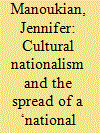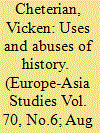| Srl | Item |
| 1 |
ID:
190106


|
|
|
|
|
| Summary/Abstract |
This article explores the historical moment in which the concept of a ‘national language’ began to spread among Ottoman Armenians. It does so by examining the establishment of educational associations aimed at changing the language practices of non-Armenophone Armenians in three parts of the Ottoman Empire: Aleppo, Kayseri and Diyarbekir. I argue that these associations were part of a larger cultural nationalist movement that gained momentum in urban centers beginning in the 1840s. Through an examination of the founding principles of the associations, I show how they sought to integrate Arabic-, Turkish- and Kurdish-speaking Armenians into the would-be national community by facilitating their acquisition of Armenian. Historiographically, this article shines a spotlight on the unexamined dynamics of Ottoman Armenian cultural nationalism and language-based identity formation.
|
|
|
|
|
|
|
|
|
|
|
|
|
|
|
|
| 2 |
ID:
171947


|
|
|
|
|
| Summary/Abstract |
This article analyzes the transformation of the political position of the Ottoman Armenian community by focusing on the community’s reactions vis-à-vis a major turning point in modern Turkish history: the proclamation of the Republic of Turkey. The article demonstrates how and why the Ottoman Armenian community reacted as it did when the status of the state as a Republic was proclaimed by the Grand National Assembly in October 1923. The major argument the article puts forward is that following the results of the Turkish-Armenian War in the Caucasus, the Greco-Turkish War in Western Anatolia, and the retreat of the French from the Cilicia region, the majority of the Ottoman Armenian community which remained within the borders of ‘New Turkey’ shifted its political position to accommodate the policies of the ruling power in order to protect their physical and cultural existence during this period of political turmoil. Benefiting from primary sources, including Ottoman Armenian and Ottoman Turkish newspapers, archival documents, and parliamentary minutes, this article focuses on the position of Ottoman Armenians following the proclamation of the Republic of Turkey, and thus contributes to the historiography on the Armistice period.
|
|
|
|
|
|
|
|
|
|
|
|
|
|
|
|
| 3 |
ID:
160852


|
|
|
|
|
| Summary/Abstract |
Did the 1915 genocide of the Ottoman Armenians play a role in the genesis of the Karabakh war? In the early phase of the conflict, many Armenian activists and politicians drew parallels between the evolving struggles of the present and the traumatic events of 1915. This essay explores the ways in which Armenia, Azerbaijan and Turkey have referred to the events of 1915 to formulate their policies towards the conflict. The essay argues that the largely suppressed past trauma was present in the mass psychology of the conflicting parties, although in radically different ways, and that it shaped developing events. After depoliticising genocide commemorations in the early years of its independence, Armenia has recently witnessed an increase in references to the genocide in political discourse. The same also applies, somewhat paradoxically, to Azerbaijan, which has developed its own state-sponsored discourse of genocide, vehemently denying that the genocide took place while portraying Azerbaijan as a victim of genocide itself. This exchange of roles clearly needs further explanation.
|
|
|
|
|
|
|
|
|
|
|
|
|
|
|
|